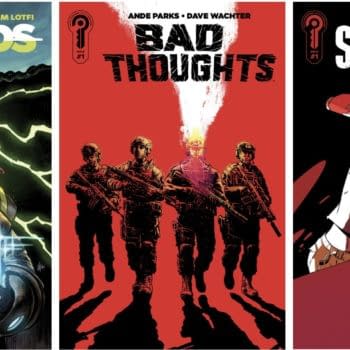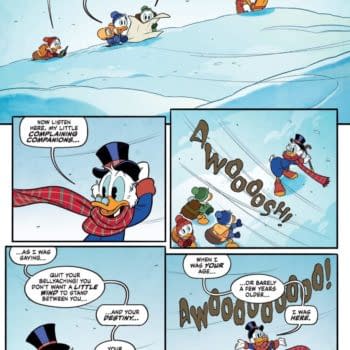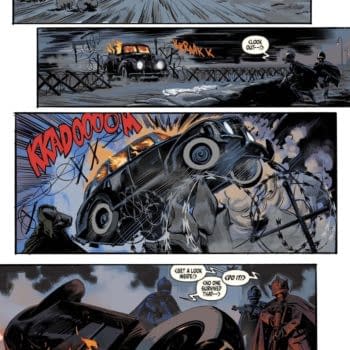Posted in: Comics | Tagged: Alan Moore, budgie, Comics, future, lee barnett, science fiction, warren ellis, Watchmen
The Future Has Stopped Making Sense – Lee Barnett Is The Adult In The Room
"It's January 2001. Where's my fucking jet pack?" — Warren Ellis
Given how many stories in comic books involve time travel, a significant number set in the future, it's telling how often we get it wrong. And I'm not even talking about the far future, thousands of years hence. No, we're equally incompetent about the near future.
Sure, there's the view that we readers and pedants should stop whining, that point best and most forcibly expressed by people using iPads and mobile phones, evidencing technologies that weren't even imagined by most of us only a few years ago.
That's the thing, though: "most of us".
Some time back, while setting up a new phone and bluetooth headset, something occurred to me that in retrospect was incredibly obvious: I could attach a small speaker to the tiny bluetooth device. Further, my new phone allowed personalised ringtones. And it had a voice recorder enabling me to record someone announcing their name and to use that as a ringtone. Final step – attach bluetooth device to chest, wait to hear "Fred calling Lee", tap the device and… Bingo! Star Trek Next Gen communicator. Yeah, this was in 2006. I know it was then, because several friends pointed me to a hospital in Northern Ireland already trialling something more advanced.
Some fiction writers have made telling entertaining stories set in the near future their speciality. And guess what: they're always wrong. That doesn't make them bad writers though, unless they're unconvincing in their inaccuracies. (As Mitch Benn among others has pointed out, it's just plain weird that the world of BLADE RUNNER doesn't appear to have mobile phones.)
It does though remind me of the reply the great and magnificent science explainer to the masses, James Burke, gave when asked why he concentrated on the past, rarely turning his attention to the consequences, connections and threads of the future. "Why don't I predict the future? I like to be right."
Writers have been trying to predict the future in fiction via the means of "falling asleep for decades or longer", or via "visits to the gods" for thousands of years; the Japanese legend Urashima Tarōut dates from the eightth century. And the absolute certainty that it's guesswork of the most desperate type ain't stopping us yet.
There's a tale told about the post-war aftermath of the late 1940s and early 1950s. I've no idea whether or not it's true, but if apocryphal, it's one of those stories that should be true: either President Truman or President Eisenhower (the story varies as these things tend to) gets the biggest brains in America to the White House; scientists, philosophers, and the like.
Their task is to predict for the president and his successors what will be the biggest challenges facing America through to the end of the century.
And – so the story goes – turns out they were right on some things and wrong on others, astonishingly wrong on others.
They suggested that hypersonic aircraft would take passengers to Australia in two hours, but manned space travel wasn't even seriously considered.
They're supposed to have predicted the huge increases in cancers, but epidemics and AIDS didn't even occur to them; neither did the huge increase in heart disease. They apparently predicted the acceptance by the masses of automation, and the massive increase in personal communication, but of course, it would be by telex.
They should have read Edwin Reynolds, who wrote in the Milwaukee Sentinel, Dec. 30, 1900:
"We may be able to carry apparatus on our persons which will enable us to communicate with another person similarly equipped, anywhere on earth, without the intervention of wires. We may be able to see persons at long distances as well as to talk with them."
1901. A great year. Baseball's American League declared itself a Major League, Clark Gable was born, and Teddy Roosevelt became President. And like their descendants 100 years later, newspapers and folks in general were debating the new century and what was likely to happen during it.

And the Chicago Tribune in the same year wrote "The purely material may claim less attention and (greedily pursued riches) come to be less regarded."
Ah, if only, eh?
In more recent times, the dystopic far future has been the predicted norm, while the near future has usually been portrayed as identical to the present, amended merely by slight advances in the field of technology.
Yet the experience of only the past few years suggests that, like those scientists at the White House, we don't have a fucking clue what's coming our way or how it's going to affect us.
And in general, comics' writers seem to acknowledge this by sticking technology in their stories that can't exist yet, or won't be commonly available for decades.
But they still get it wrong. OK, we don't have a Lex Luthor, a Tony Stark, a Reed Richards or even a Bruce Wayne, though the latter would – as Bob Ingersoll pointed out some years ago – currently be in jail for breach of fiduciary duty to WayneTech stockholders.
The writers are not just wrong in the inventions and advances they predict, but in ignoring their larger effect upon society.
If we did have such men, and their inventions, there's no way the social environment of the richer nations would be remotely comparable to their current analogues in our world. (They're usually men, come to think of it; who are the female geniuses in comics? Serious question.)

Alan Moore – in, of course, WATCHMEN – made it crystal clear that the new engines created by Doctor Manhattan had destroyed the old motor vehicle industry. That's one of the few 'wider implication' stories, and it's presented almost as a throwaway scene, something that of course would happen.
There's a bloke fighting extradition to the United States at the moment; he hacked into 97 US Military and NASA computers over a thirteen month period… ten years ago. A full decade ago – what could he and similar folks discover now? Hell's teeth – even I could go online and get torrents of the latest games, business and hacking software without difficulty. Does anyone think that the inventions created by Stark, Richards et al wouldn't be available online? Notwithstanding the 1951 satire, The Man In The White Suit, what would clothes made of unstable molecules actually do to the fabric manufacturing industry? How would commercial aircraft design differ, with the existence of Quinjets and Fantasticars?
And why should it stop there? Back to James Burke, who at a Q&A session at the Royal Institution a few months back broke his self-imposed rule and predicted that nanotech 'makers', right out of TRANSMETROPOLITAN, would be available inside thirty years. And yes, they'd be phenomenally expensive… to start with. Until someone uploads the design specs to the internet. And within a decade after that, they'd be cheaper, a lot cheaper. Thing is – again, harking back to the social implications – economics and politics is, in a major part, the allocation of scare resources. What happens to politics and economics in the absence of scarcity?
The responsibility of any storyteller is simply that – to tell entertaining stories. They owe no loyalty to their 'fans' (c.f. Neil Gaimain's blog entry 'George R R Martin is not your bitch' but only to their contracts, to deliver the best written stories they can.
But while any fiction requires suspension of disbelief, in my view it has to maintain an internal integrity; ignoring the social and cultural implications of near future inventions – accurate or otherwise – serves no one, least of all the reader.
Lee Barnett is a writer. He's written comic books, radio comedy for the BBC and two collections of short stories under the title THE FAST FICTION CHALLENGE. He's also a contributor to elephantwords. Known in the UK Comics industry for the annual hypotheticals panel he devised and presented with Dave Gibbons at the UK Comics Festival, some people call him "budgie".















